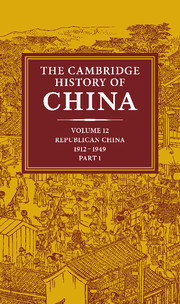Book contents
- Frontmatter
- 1 Introduction: Maritime and continental in China's history
- 2 Economic trends, 1912–49
- 3 The foreign presence in China
- 4 Politics in the aftermath of revolution: the era of Yuan Shih-k'ai, 1912–16
- 5 A constitutional republic: the Peking government, 1916–28
- 6 The warlord era: politics and militarism under the Peking government, 1916–28
- 7 Intellectual change: from the Reform movement to the May Fourth movement, 1895–1920
- 8 Themes in intellectual history: May Fourth and after
- 9 Literary trends I: the quest for modernity, 1895–1927
- 10 The Chinese Communist Movement to 1927
- 11 The Nationalist Revolution: from Canton to Nanking, 1923–28
- 12 The Chinese bourgeoisie, 1911–37
- Bibliographical essay
- Bibliography
- Index
- Republican China – physical features
- References
8 - Themes in intellectual history: May Fourth and after
Published online by Cambridge University Press: 28 March 2008
- Frontmatter
- 1 Introduction: Maritime and continental in China's history
- 2 Economic trends, 1912–49
- 3 The foreign presence in China
- 4 Politics in the aftermath of revolution: the era of Yuan Shih-k'ai, 1912–16
- 5 A constitutional republic: the Peking government, 1916–28
- 6 The warlord era: politics and militarism under the Peking government, 1916–28
- 7 Intellectual change: from the Reform movement to the May Fourth movement, 1895–1920
- 8 Themes in intellectual history: May Fourth and after
- 9 Literary trends I: the quest for modernity, 1895–1927
- 10 The Chinese Communist Movement to 1927
- 11 The Nationalist Revolution: from Canton to Nanking, 1923–28
- 12 The Chinese bourgeoisie, 1911–37
- Bibliographical essay
- Bibliography
- Index
- Republican China – physical features
- References
Summary
THE MAY FOURTH INCIDENT
It goes without saying that many factors combined to create the great intellectual upsurge of 1919 and the early 1920s that in the Chinese fashion has been given a neutral numerical designation as the ‘Five-four’ (Wu-ssu, that is, fifth month, fourth day) movement. There were several necessary developments behind this phase of China's intellectual transformation, the first and foremost being the creation of Peking University (generally abbreviated as Peita) as a modern institution of higher learning. From 1917 it was under the leadership of a new president, Ts'ai Yuan-p'ei (1867-1940). Ts'ai's career spanned the old and the new eras. By the age of 25 he had distinguished himself in classical studies at the Hanlin Academy but he subsequently became a revolutionary in the T'ungmeng hui, studied Western philosophy in Germany for four years, and served as the Chinese Republic's first minister of education for six months in 1912. Taking control at Peita, he welcomed ideas from all over the world and collected a faculty of brilliant young men of diverse backgrounds.
This institutional development soon brought forth a major linguistic reform, namely pai-kua, the written vernacular. Ch'en Tu-hsiu (1879-1942), who became dean of letters, had studied in Japan and France, participated in the Revolutions of 1911 and 1913, and founded several magazines including Hsin ck'ing-men (New youth) in 1915, which he continued to edit after becoming dean. Another classically-trained young scholar, Hu Shih (1891-1962) returned to Peita from study between 1910 and 1917 at Cornell and Columbia. Hu Shih soon had Ch'en Tu-hsiu's support in the promotion of pai-hua, as an essential tool both for modern thinking and for bringing education to the common people.
Keywords
- Type
- Chapter
- Information
- The Cambridge History of China , pp. 406 - 450Publisher: Cambridge University PressPrint publication year: 1983
References
- 5
- Cited by



